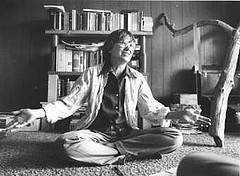M.J. Engh’s Rainbow Man was on the Tiptree Award longlist for SF novels doing things with gender, and it was also nominated for the Prometheus Award for libertarian SF, an odd combination, but one that feels exactly right.
Rainbow Man is a science fiction novel set in a densely populated but slower than light universe, cut by starships making huge arcs between settled planets. Liss was born ten years before her ship ran into a cluster of settled worlds, and now the ship is about to pass out of it into another long haul through the dark. She decides to stop on the planet of Bimran, which seems very nice but into which she has done far too little research. Bimran has no money and no laws (that’s the Libertarian bit) but it does have four commandments, against murder, abuse, idolatary and fornication. All sex outside of marriage is fornication, and anyone who isn’t fertile counts as a man, which is Liss’s problem. She’s a straight woman who has chosen to make choices against reproduction, and on Bimran that makes her a man. And this is where the Tiptree relevance comes in, because we see what would be to us a straight relationship defined as a queer and dangerous one. “It isn’t any more unfair because it applies to you,” says Liss’ offworld friend Leona.
This was my first re-read of Rainbow Man, so in the way I think of it, it completed my reading of the book—re-reading it knowing what’s going to happen is a different experience. I left it quite a long time between readings—three or four years—because it’s such a wrenching book. Having said that, it’s not a patch on Engh’s first novel Arslan for that. Engh is always brilliant but disturbing, and I am not always in a mood to be disturbed.
Rainbow Man is a first person novel and a very immediate one. All Engh’s writing feels like being there. There aren’t many characters, but they are all detailed and vivid and real. Reading this for the first time is an adventure, stepping off a starship and learning about a new world along with Liss. The little details that make up the world, the floatboards, the park, the fact that shaking your head from side to side in negation is weird to Liss, her fascination with weather, her reluctance to stop wearing the brightly coloured clothes that earn her the nickname “Rainbow Man.” Then there are the casual mentions of other worlds, and of the culture of the starships, or at least of Liss’ starship, because they are different. There’s a whole economy of slower-than-light starships moving things around in the hope of a profit somewhere but an intention of keeping moving, which is unusual, and like the background in some of Cherryh’s works, or like Permanence, but not something you see done very often. I couldn’t put it down, I read the whole book in one sitting and then couldn’t sleep.
Re-reading it, knowing it’s an inescapable tragedy is quite another thing, because you know that all the light-hearted playing and fun, and all the voluntary working to make the world work covers up the threat of Selection. The visit to the Selection Center where you can see people in Bliss or Punishment, with the pleasure or pain centers of their brains activated, is horrifying—I think either of those things would be a dreadful way to live, if you can call it living. The thought of people going out there to see them is chilling. Then there’s the issue of the end—we don’t know what the ship they have escaped on is like, and they’re on it for the long haul. Beyond that, Doron refused to escape, and by the time Liss wakes up, Doron has undergone an eternity of torture and died.
In the end it’s not sex but religion that gets Liss into real trouble—people are meditating on her woven gold balloons, and that’s idolatry. This is clever, as we’ve been set up to expect it to be sex—with Sarelli or with Doron, and it’s easy to miss the whole religion thing because it’s so big. This is really a book about people enforcing their own heaven and hell on Earth—or in this case, Bimran —and the problems it causes to play God when you’re not God. Most of the people on Bimran are seem to be happy—and that’s the problem. How can you ever know the truth when people are afraid of a lifetime of torture? Laws, however imperfect a compromise, are a much better protection than community standards.
This is an excellent and thought-provoking novel.
Jo Walton is a science fiction and fantasy writer. She’s published eight novels, most recently Half a Crown and Lifelode, and two poetry collections. She reads a lot, and blogs about it here regularly. She comes from Wales but lives in Montreal where the food and books are more varied.










